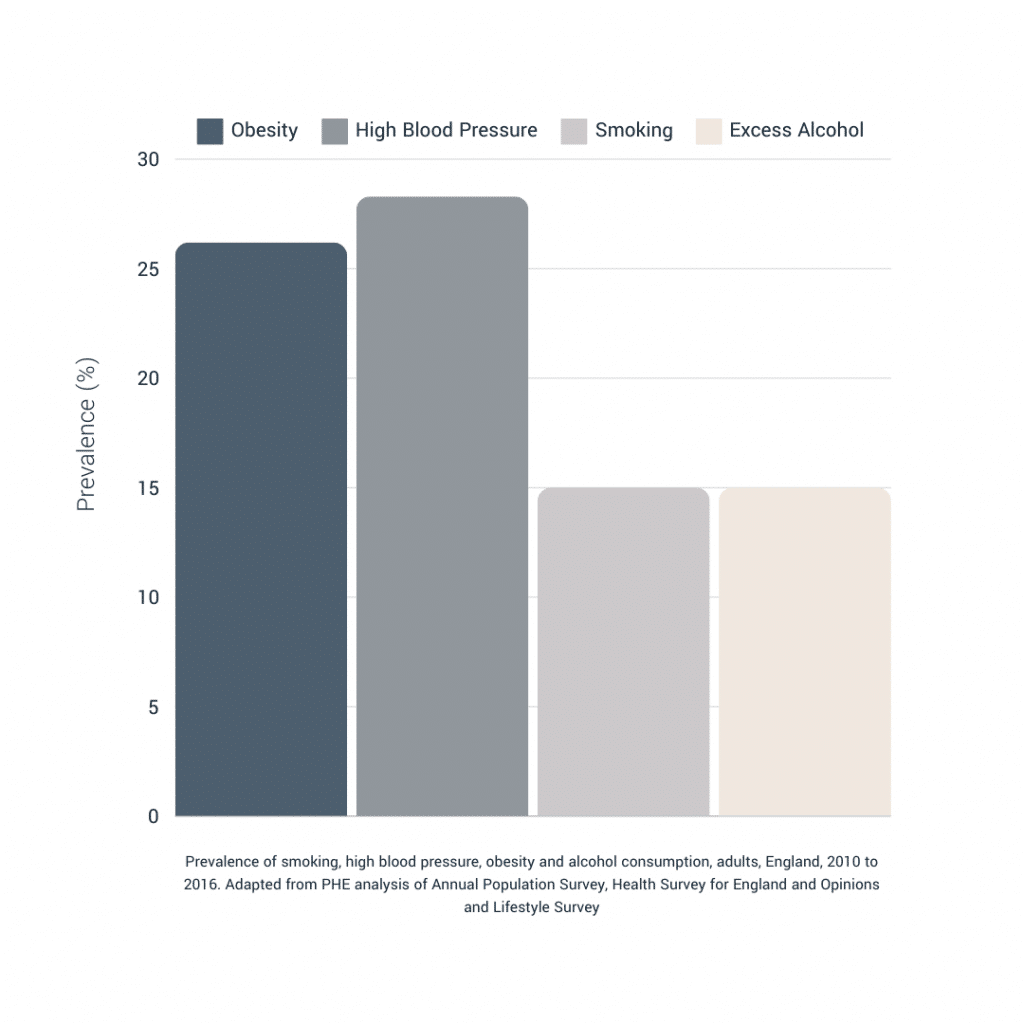Written by Anna Kallianteri, RD, BSc, MSc, Lead Dietitian & Sabine Hoadley, Bsc (Hons), Lead Exercise Scientist
Did you know that 40% of the NHS costs go on treating preventable conditions (1)?
Diseases that are associated with the lifestyle of an individual are known as lifestyle disorders, or non communicable diseases (NCDs) or chronic diseases.
Preventable chronic diseases with lifestyle interventions include cardiovascular diseases, diabetes, metabolic syndrome, obesity, hypertension, high cholesterol and more.
Lifestyle habits and behaviours such as having a balanced healthy diet, being regularly active, managing stress, having restorative sleep, avoiding risky substances and engaging into positive social connections have been shown to have a positive effect on the management of chronic diseases (2).
Causes of Lifestyle Diseases (3)
Different factors contribute to the development of lifestyle diseases. These can be divided into modifiable, non-modifiable and metabolic risk factors.
The modifiable risk factors are those that we can work with and have to do with our individual behaviour. Some prime examples commonly found in our modern lifestyle are our alcohol consumption, our smoking and tobacco behaviours, physical inactivity, a sedentary lifestyle and stress related to work.
On the other hand, the non-modifiable risk factors are those we cannot control or modilfy as these include our age, race, gender and genetics.
The metabolic risk factors are those that can change our metabolism and increase our chances of lifestyle diseases. These include elevated blood pressure or blood sugar levels, living with obesity or having high cholesterol.

How can we Manage Lifestyle Diseases?
- Did you know that a walking speed of 4 km/hour or more is linked to a significantly lower risk of type 2 diabetes? A recent study showed that with every 1 km/hour increase in your walking speed was associated with a 9% lower risk of developing type 2 diabetes (4).
- According to the World Health Organisation (WHO), cardiovascular diseases (CVDs) are globally the number 1 cause of mortality, currently estimated to cause 32% of all deaths.
- A combination of exercise and diet over 6-12 months can produce a reduction in our body weight by ~7-10%, and a combination of regular aerobic exercise with 150-250 minutes of moderate intensity activity weekly is recommended for better management of metabolic syndrome (5).
For all lifestyle diseases, different lifestyle modifications can be helpful in managing them. Irrelevant of the specific condition, having a healthy diet, managing your stress levels, being regularly active, having sufficient sleep, checking your blood pressure and weight regularly to achieve healthy levels, can significantly decrease your chances for the development of chronic conditions and improve their management. Also, if you are a regular smoker, considering quitting smoking will work in favour of your health.
Your Future Health
Looking to the future, it is clear that modern life holds some unhealthy traits that contribute to your risk of developing a lifestyle disease. The good news is that these conditions are largely preventable – you can make healthy choices in your day-to-day life to reduce your risk of developing these conditions.
At Uniquely Health, we take pride in our clinical service to help you improve your healthspan and longevity. We offer specialist guidance taking a preventative approach to several lifestyle conditions relating to metabolic health, including blood glucose control, cholesterol regulation, blood pressure control and managing body weight.
Our data-driven, and personalised service supports sustainable, long-term changes, recognising the intrinsic link between fitness, nutrition, and overall health.
It’s better to invest in your health now than to leave it too late.
Key Conclusions
1. Lifestyle diseases are preventable and manageable with lifestyle interventions.
2. Effective lifestyle interventions include a healthy diet, regular activity, managing stress levels and sufficient sleep.
3. Checking blood pressure and weight regularly can support improved health.
If you are looking for support to reduce your risk or manage a lifestyle disease, book a complimentary call with our team to discuss how we can help you.
- UK Gov, 2022. Health and Social Care Secretary speech on Health Reform. Available at <https://www.gov.uk/government/speeches/health-and-social-care-secretary-speech-on-health-reform> Accessed 20th March 2024
- Hu F.B., Manson J.E., Stampfer M.J., Colditz G., Liu S., Solomon C.G., et al. Diet, lifestyle, and the risk of type 2 diabetes mellitus in women. N Engl J Med. 2001;345:790–797.
- Pandit, Avdhoot. (2023). Lifestyle disorders: An emerging health problem (causes and prevention from nutritional perspective). 11. 11-14.
- JayediA, Zargar M, Emadi A, et al . Walking speed and the risk of type 2 diabetes: a systematic review and meta-analysis. British Journal of Sports Medicine Published Online First: 28 November 2023. doi: 1136/bjsports-2023-107336
- Kim HL, Chung J, Kim KJ, et al. Lifestyle Modification in the Management of Metabolic Syndrome: Statement From Korean Society of CardioMetabolic Syndrome (KSCMS). Korean Circ J. 2022;52(2):93-109. doi:10.4070/kcj.2021.0328
- Bell I.R., Caspi O., Schwartz G.E.R., Grant K.L., Gaudet T.W., Rychener D., et al. Integrative medicine and systemic outcomes research: issues in the emergence of a new model for primary health care. Arch Intern Med. 2002;162:133–140









